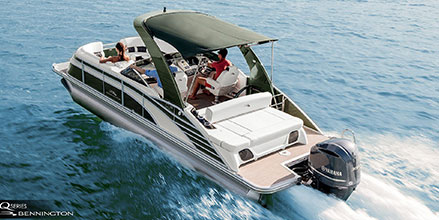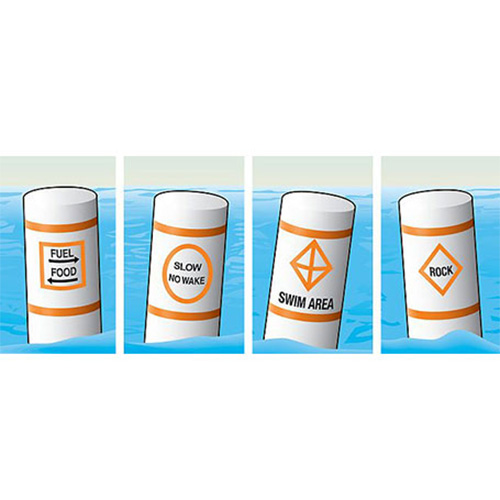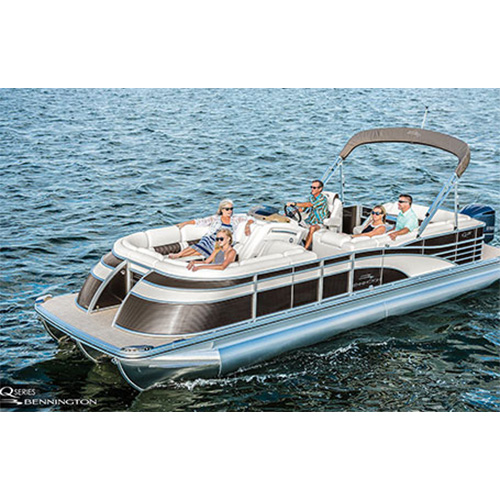
Tips for Pontoon Boating on Saltwater
As pontoon boats evolved from somewhat crude slow-speed platforms initially suited only to small lakes into sleek and capable powerboats, more and more boaters began taking them on salt water. This is great and Bennington heartily approves, as long as you keep these factors in mind to operate safely and keep the boat itself in good condition.
Small Waves Good; Large Waves Not So Much
In mild sea states with waves of 2 feet or less, pontoon boats are more stable than most V-hulls. Their wide stance easily straddles small waves and chop, so the boat doesn't rock nearly as much. This is especially apparent during slow-speed operations like trolling, and at anchor.
When waves get higher, the situation reverses. When a larger wave approaches a pontoon boat broadside, the boat will float with both tubes on the face of the wave, taking whatever angle from the horizontal the wave is at. A V-hull, on the other hand, will stay more upright, for a safer and more comfortable ride in rough conditions.
When moving at speed into steep waves, the fronts of the tubes can be buried, causing the wave to crash forcefully into the abovedeck panels, or over them, onto the deck. The panels are also vulnerable to waves striking the boat from other directions.
Additionally, the deck areas of pontoon boats are wider and more exposed than the cockpits of most other types of powerboats. A wave that breaks over the rails on a pontoon can more easily sweep the deck and knock people off their feet.
Bottom line: feel free to use your pontoon on salt water if conditions are good. A protected saltwater bay, inlet, or mangrove swamp is often a more suitable pontoon boating environment than the open ocean. Keep an eye on the weather, keep your weather radio set for alerts, and avoid rough conditions.
Here Comes the Sun
An outing on the ocean is often of longer duration than one on a lake, and you generally can't ease up to a shady, tree-lined shoreline for lunch. A canvas bimini or sunshade is therefore highly advisable; and copious amounts of sunblock, applied and reapplied frequently, are essential. Bring a sun hat, sunglasses, and plenty of drinking water to stay hydrated.
Preventing Corrosion
Corrosion is one of the biggest potential problems for aluminum boats on saltwater. Aluminum on its own is fairly non-reactive, and it corrodes at quite a slow rate. But stainless steel bolts, copper electrical wiring, and possibly other metal fittings are in contact with the aluminum, and salt water provides the perfect conductor for galvanic corrosion to occur.
This is minimized by some pontoon boat makers, who isolate as many of these connections between unlike metals as possible. But you need to take further steps, installing sacrificial anodes ("zincs") to take the hit before your aluminum tubes or your engine's lower unit does.
When you're done with a day of boating on salt water, wash the boat thoroughly with fresh water from a high-power hose to flush out any trapped salt water and remove dried salt deposits. It's far better to store pontoon boats out of salt water, but if in-water storage is chosen, the tubes and lower unit must be painted with special paint that's both anti-fouling and anti-corrosive.
Despite taking some extra effort, saltwater pontoon boating is worth it: the scenery is different from lake and river boating, the fishing is different, the challenges are different (you may have to learn navigation for the first time), and the rewards are different. If you live near the coast or are visiting it on vacation, take your pontoon out to sea and enjoy a different kind of pontoon experience.
Want to go pontoon boating at sea or anywhere else? Check out the latest Bennington pontoon boats, then find a Bennington dealer near you.












